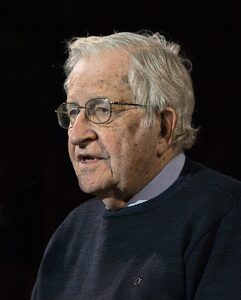Noam Chomsky Death: Noam Chomsky, a prolific writer, esteemed professor, passionate critic of Israel and advocate for peace for Palestinians has died. He was 95 years old. Noam sometimes called “the father of modern linguistics, also a major figure in analytic philosophy and one of the founders of the field of cognitive science. More than any other thinker in the postwar era, Noam Chomsky has embodied Karl Marx’s favorite dictum: “nothing human is alien to me.”
Who Was Noam Chomsky?
Avram Noam Chomsky who was born December 7, 1928 was an American professor and public intellectual known for his work in linguistics, political activism, and social criticism. He was a laureate professor of linguistics at the University of Arizona and an institute professor emeritus at the Massachusetts Institute of Technology (MIT). Among the most cited living authors, Noam has written more than 150 books on topics such as linguistics, war, and politics. Ideologically, he aligns with anarcho-syndicalism and libertarian socialism.

Born to Ashkenazi Jewish immigrants in Philadelphia, Noam developed an early interest in anarchism from alternative bookstores in New York City. He studied at the University of Pennsylvania. During his postgraduate work in the Harvard Society of Fellows, Noam developed the theory of transformational grammar for which he earned his doctorate in 1955. That year he began teaching at MIT, and in 1957 emerged as a significant figure in linguistics with his landmark work Syntactic Structures, which played a major role in remodeling the study of language. From 1958 to 1959 Noam was a National Science Foundation fellow at the Institute for Advanced Study. He created or co-created the universal grammar theory, the generative grammar theory, the Noam hierarchy, and the minimalist program. Noam also played a pivotal role in the decline of linguistic behaviorism, and was particularly critical of the work of B. F. Skinner.
Noam is widely recognized as having helped to spark the cognitive revolution in the human sciences, contributing to the development of a new cognitivistic framework for the study of language and the mind. Noam remains a leading critic of U.S. foreign policy, contemporary capitalism, U.S. involvement and Israel’s role in the Israeli–Palestinian conflict, and mass media. Noam and his ideas are highly influential in the anti-capitalist and anti-imperialist movements. Since 2017, he has been Agnese Helms Haury Chair in the Agnese Nelms Haury Program in Environment and Social Justice at the University of Arizona.
Early career
Noam befriended two linguists at the Massachusetts Institute of Technology (MIT)—Morris Halle and Roman Jakobson—the latter of whom secured him an assistant professor position there in 1955. At MIT, Noam spent half his time on a mechanical translation project and half teaching a course on linguistics and philosophy. He described MIT as open to experimentation where he was free to pursue his idiosyncratic interests. MIT promoted him to the position of associate professor in 1957, and over the next year he was also a visiting professor at Columbia University. The Noam had their first child, Aviva, that same year. He also published his first book on linguistics, Syntactic Structures, a work that radically opposed the dominant Harris–Bloomfield trend in the field.
Responses to Noam’s ideas ranged from indifference to hostility, and his work proved divisive and caused “significant upheaval” in the discipline. The linguist John Lyons later asserted that Syntactic Structures “revolutionized the scientific study of language”. From 1958 to 1959 Noam was a National Science Foundation fellow at the Institute for Advanced Study in Princeton, New Jersey.
Noam joined protests against U.S. involvement in the Vietnam War in 1962, speaking on the subject at small gatherings in churches and homes. His 1967 critique of U.S. involvement, “The Responsibility of Intellectuals”, among other contributions to The New York Review of Books, debuted Noam as a public dissident.
This essay and other political articles were collected and published in 1969 as part of Noam’s first political book, American Power and the New Mandarins. He followed this with further political books, including At War with Asia (1970), The Backroom Boys (1973), For Reasons of State (1973), and Peace in the Middle East? (1974), published by Pantheon Books. These publications led to Noam’s association with the American New Left movement, though he thought little of prominent New Left intellectuals Herbert Marcuse and Erich Fromm and preferred the company of activists to that of intellectuals. Noam remained largely ignored by the mainstream press throughout this period.




